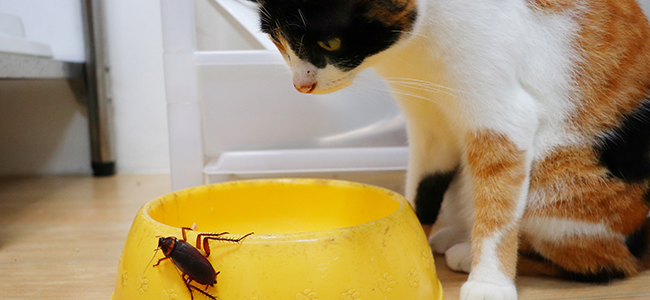Get a free estimate
If you have questions about our services, plans, or pricing we are here for you. Fill out the form below and we will communicate with you by email (and of course provide you with a free estimate).
NOVEMBER 17 2021 /
Bugs can be just as annoying to our pets as they are to us. Some insects thrive by latching onto our furry friends, while others may simply deliver a bite or sting as an act of defense. Further still, there are numerous creepy crawlies that can cause dogs and cats to become severely ill if they attempt to eat them as a snack.
It is very important to check your pet for ticks after spending any amount of time outside, especially if you've been exploring wooded areas. If you find a tick on your dog or cat, immediately remove it using tweezers.
If a tick remains unnoticed on your pet for a long period of time, tick paralysis may occur.
Symptoms of this include:
If tick paralysis is left untreated, it can lead to death.
Ticks are also carriers of Lyme disease, which can be transmitted to both pets and humans. Applying a flea and tick product to your pet is certainly a good idea, but be sure you are using the correct type: most products meant for dogs are toxic to cats.
In addition to the numerous diseases mosquitoes can pass on to humans, they can also pass heartworm on to our furry friends. There is no way to know if a mosquito is a carrier of heartworm.
If your dog or cat contracts heartworm and the symptoms are left untreated, death can occur within a few months.
Parasite control products will help reduce your pet's risk of contracting heartworm from a mosquito. Of course, it is also possible for your pest to be bitten by a disease-free mosquito. If this is the case, they will simply experience the same itchy welts that we do.
The United States is home to two species of poisonous spiders: the black widow and the brown recluse. While it is rare to spot a brown recluse in the Maryland, D.C., and Virginia regions, it is not uncommon to find yourself face-to-face with a black widow.
It can actually take a few days for the symptoms of a spider bite to appear. These include but are not limited to:
If left untreated, poisonous spider bites can lead to deep tissue damage and even amputation. It is important to be sure that your pet does not lick the site of the infection, as this typically only worsens the situation.
Itchy and Irritating Bites

Just like humans, only some pets are allergic to bees and wasps. If you find that your furry friend has been stung, it is best to err on the side of caution and take them to the vet.
This is especially true if you see any signs of an allergic reaction, such as swelling, seizures, or respiratory distress.
If your dog or cat comes into contact with an anthill, they could get a large number of bites within a short amount of time.
These bites will often resemble hives and can spread all over the body. It is not common for a serious reaction to occur, but anaphylaxis is always a possibility.
For the most part, ant bites are just itchy and uncomfortable. If you notice ant bites on your pet, take him or her to the vet. A veterinarian will be able to provide treatment to reduce the severity of the reaction.
Our furry friends are not immune to these incredibly annoying pests. Bed bugs can bite animals just as they bite us. If you have bed bugs in your home, it is important to contact a pest control professional immediately.
The main problem with flea bites is that they are incredibly annoying and itchy. However, some pets who are allergic to fleas can develop something much worse: allergic dermatitis.
An allergic reaction such as this may cause your dog or cat to scratch so much that their skin bleeds, which can cause sores and hairless spots.
If you notice any of these symptoms, be sure to take your pet to see a veterinarian, as they will be able to prescribe antibiotic treatment. Also, be sure to ask about a prescription flea repellent product for your pet, in order to prevent future flea bites.
Can My Pet Eat That Bug?

Also known as lightning bugs, fireflies contain lucibufagins, which is the toxin that makes them glow. Fireflies can be poisonous not just to dogs and cats, but also to lizards, amphibians, and birds. Eating a lightning bug will simply cause an upset stomach in larger animals, but has been known to kill lizards and cats.
Monarch Butterflies hide their eggs in milkweed plants. While the butterflies themselves are not toxic to animals, the milkweed plant and monarch caterpillars are.
Luckily, it is unlikely that a dog or cat will attempt to eat either of these things since they have a very bitter taste. If a milkweed plant or a monarch caterpillar is ingested, it is best to visit a veterinarian right away. Untreated symptoms can lead to eventual death.
Outside of the monarch, other species of caterpillars are actually capable of injecting venom into or stinging curious pets. Some, like the wooly bear, don't sting or bite but are toxic themselves. All in all, it is best to keep your pets away from caterpillars if you want to avoid an allergic reaction.
If your furry friend ingests a cockroach, it will not be enjoyable for either party involved. Since these critters can carry parasites, eating one can cause stomach worms in pets. The same result may happen if beetles or crickets are eaten.
In the case of any insect bite, sting, or ingestion, it is best to call your veterinarian for advice on what to do. Many medications and topical creams we may use to treat similar symptoms in humans are not safe for our pets to come in contact with. If you have concerns about bugs in or around your home, be sure to contact the professionals here at American Pest. We are ready to work with you to find the safest pest control solution for you, your family, and your pets.